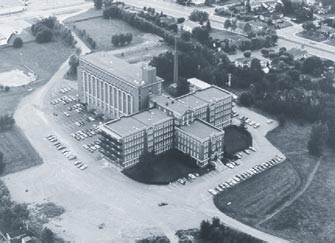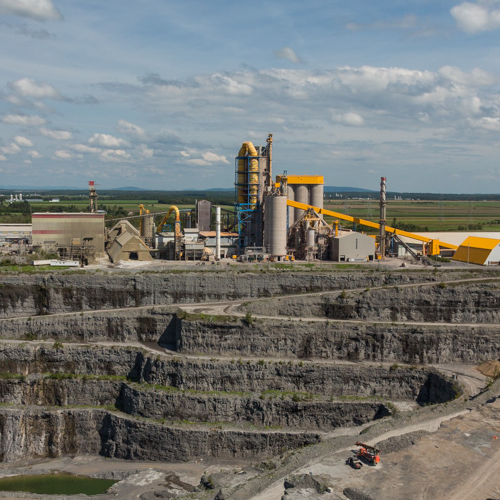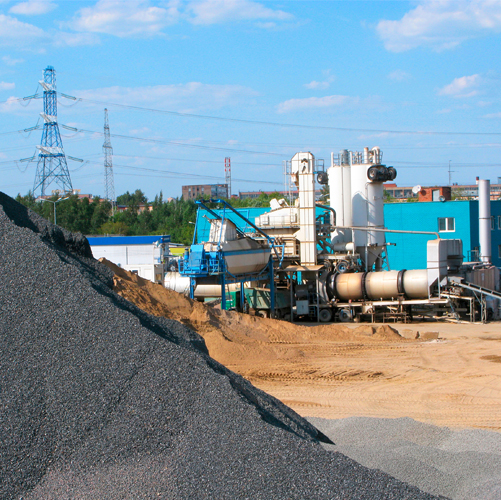The obsolescence of its heavy fuel oil equipment, chimney structure and environmental awareness caused La Fondation Sagamie to opt for natural gas.
 La Fondation Sagamie is a member entity of Groupe de la Fondation de l’Université du Québec à Chicoutimi. It is the owner of Pavillon Sagamie, which was recognized in 1999 as a Carrefour de la nouvelle économie by the Government of Québec.
La Fondation Sagamie is a member entity of Groupe de la Fondation de l’Université du Québec à Chicoutimi. It is the owner of Pavillon Sagamie, which was recognized in 1999 as a Carrefour de la nouvelle économie by the Government of Québec.
The pavillion’s facilities consisted of a Volcano boiler, dating from 1960 and operating on heavy fuel oil. This assured production of high-pressure steam necessary to meet the building’s needs. The boiler’s original power was 500 HP, reduced to 300 HP over the years. When it began to show signs of fatigue, the Fondation’s people considered its replacement.
During the replacement process, the Fondation considered the following factors in the project:
-
The chimney, over 100 feet high, was beginning to crack in some places and had to be repaired or simply demolished to be replaced;
-
Management of complaints from neighbouring residents, who questioned the presence of a plume of black smoke, a fuel oil odour and fine dust emitted when the boiler was in operation;
-
The Fondation’s environmental awareness in seeking to use cleaner energy than heavy fuel oil.
The time had come to look at the implications of using a less polluting energy source. The Fondation had always used heavy fuel oil because it was under the impression that it was cheaper to use than natural gas.
Even though heavy fuel oil has higher combustion efficiency than natural gas, it is an economically debatable choice. The system’s overall efficiency must be considered, for two important reasons:
-
Comparing the costs based only on losses up the chimney disregards the losses attributable to heavy fuel oil and distorts the actual costs of hot water or steam production;
-
Quantifying the losses in the boiler and the other losses associated with the fuel used to determine the overall efficiency and the actual costs.
The table of comparison of the overall efficiency of the system clearly shows the overall gain in favour of natural gas1.
| Natural gas | Fuel oil | |
| Combustion efficiency | 82.05% | 85.05% |
| Type of loss | Natural gas | Fuel oil |
| Oil tank heating loss | — | 0.55% |
| Oil preheating loss | — | 0.20% |
| Loss in the soot blowers | — | 0.45% |
| Smoke side clogging | — | 2.00% |
| Oil atomization | — | 1.65% |
| Loss for additional water and water treatment chemicals | — | 0.35% |
| Oil pumping loss | — | 0.20% |
| Premature corrosion and maintenance loss | — | 2.00% |
| Oil additives | — | 0.60% |
| Radiation loss | 1.25% | 1.25% |
| Purge losses | 0.70% | 0.70% |
| Total losses | 1.95% | 9.95% |
| Natural gas | Fuel oil | |
| Overall efficiency (combustion efficiency minus losses) | 80.10% | 75.10% |
| Overall gain in favour of natural gas | 5,00% |
The solution implemented
The Gaz Métro sales representative met with the Fondation’s management with a DATECH Group consultant to make them aware of the efficiency of natural gas compared to fuel oil. At this meeting, they discussed different replacement and conversion scenarios while setting out the advantages and disadvantages of each of them.
Synergétik, a company specializing in boiler renovation, was mandated to design scenarios, establish their implementation and operating costs and look for financial assistance which could be applicable to each. The challenge consisted of designing a less polluting system meeting the budget currently allocated to energy.
The option chosen was the one that brought us closer to the objective. It consists of the use of two Miura natural gas-fired steam boilers. The first has a power of 100 BHP and the second of 50 BHP. This option makes it possible to obtain good modulation and safe supply. A DDC control system is in place to optimize operation of the boilers, adjust the water temperature of the heating zones according to the outdoor temperature and finally shut down the hot-water heating pumps when the outdoor temperature reaches a level at which heating is no longer required.
The project has been a success on all points. By opting for the solution offered by natural gas, the client has solved the complaint problems with much cleaner combustion, obtains a lower maintenance cost, benefits from a cleaner and odourless mechanical room and responds to its environmental concern. The reductions contribute to reduce greenhouse gas emissions, acid rain and smog, while very locally they eliminate the black smoke and fine dust emitted by the previous heating system. In addition, last year La Fondation Sagamie operated its heating plant on the same operating budget as when it used heavy fuel oil.
| Project costs | |||
| Costs of the work | $327,000 | ||
| Financial assistance obtained | $95,035 | ||
| Actual costs | $231,965 | ||
| Avoided cost | Chimney replacement | ||
| Energy balance | |||
| Before | Currently | ||
| Heavy Oil | Electricity BT | Natural Gas | |
| Consumption | 257,575 litres | 216,000 kWh | 212,920 m3 |
| Consumption in Gj | 11,112 | 778 | 7,927 |
| Greenhouse gas emissions (GHG in tonnes of CO2 equivalent) | 797 tonnes | 405 tonnes | |
| Annual savings | |||
| Reduction of energy consumption | 3,963 GJ | ||
| Reduction of greenhouse gases * (GHG in tonnes of CO2 equivalent) | 392 tonnes | ||
*The emission levels of several other pollutants are also greatly reduced. We should mention SO2, NOx and particulate materials, which have been practically eliminated.
We can conclude that it is advantageous to replace heavy heating oil profitably when all the advantages of using natural gas are taken into consideration.
Daniel Gendron, Eng.
Technical Advisor
DATECH Group
Special thanks to Laurent Richard of Synergétik of Trois-Rivières, for his active participation in the production of this article.
Continue reading








